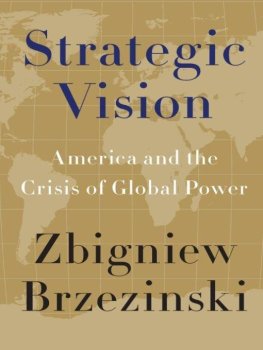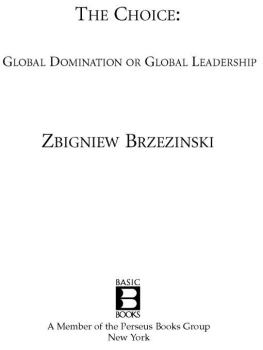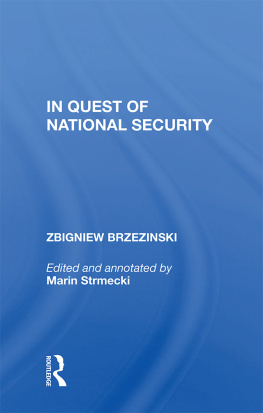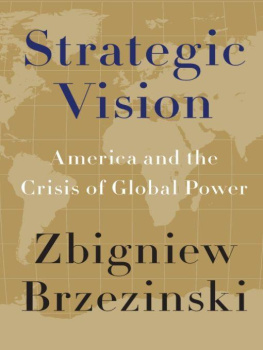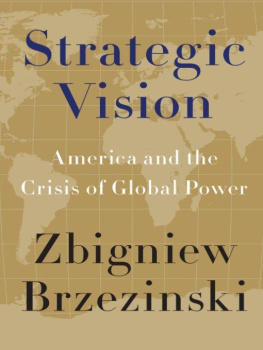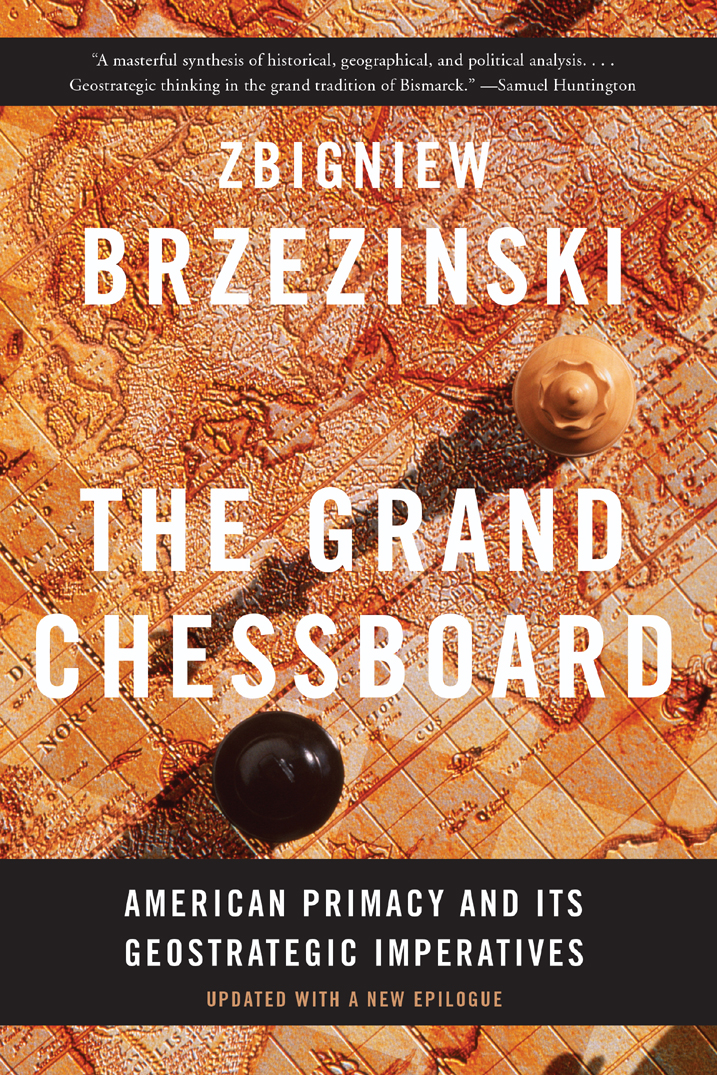Praise for The Grand Chessboard
[Brzezinski] has now provided another scholarly blueprint for what he believes the United States should do in coming years to further Americas interests, maintain the hegemony it commands, and prevent global anarchy. For Brzezinski this is a strategic game, not unlike chess, to outwit potential rivals.... Brzezinski has now stated and restated his concerns. His books are there for any political leader to use as material for future policy declarations. But it is difficult in the current situation to imagine much of a competition to take up Brzezinskis ideas, however well they are argued here.
BERNARD GWERTZMAN, New York Times
The great merit of this volume lies in its analysis of the strategic outlook and policy dilemmas of a host of states in Eurasia. Brzezinskis analysis of the triangular relationship among China, Japan, and Americatogether with the policy recommendations flowing therefromis particularly good.
Foreign Affairs
At its best, The Grand Chessboard makes permanent contributions to the national debate over American foreign policy and power. At its worst, it demonstrates the need for contemporary statesmen and political thinkers to immerse themselves more deeply in the rich tradition of Anglo-American strategic thought that brought first Britain and now the United States to global preeminence at an astonishingly low cost.
Los Angeles Times Sunday Book Review
The book is a must... for the current American foreign-policy decision-makers.
H-Net
The former national security advisor is still a believer in geopolitics after all these years. Like most foreign-policy aficionados weaned on the Cold War, Brzezinski... has been forced by the disintegration of the Soviet Union to broaden his perspectivebut not very far.... Like a grandmaster in chess, he plots his strategy several moves in advance.... This updated version of East-West geopolitics is worth taking seriously but it is also an amazing example of how a perspective can be revised without actually being rethought.
Kirkus Reviews
The Grand Chessboard is the book we have been waiting for: a clear-eyed, tough-minded, definitive exposition of Americas strategic interests in the postCold War world.
SAMUEL HUNTINGTON, Harvard University, author of The Clash of Civilizations and the Remaking of World Order
The Grand Chessboard is, at last, a lucid, brilliantly presented exposition of the necessary new framework for American foreign policy, tying together the objectives for the short, medium, and long term that the country should now begin to implement. This fills a vital need.
FLORA LEWIS, columnist, International New York Times
In this incisive bookitself on the most important documents to emerge in the wake of the Cold Wars endZbigniew Brzezinski displays his legendary scope and intellectual acuity in giving purpose to American power. In this time of drift, Brzezinski remains Americas paramount strategic mind.
NATHAN GARDELS, editor, Global Viewpoint
The Grand Chessboard will shock the timid, infuriate the unimaginative, and inspire the thoughtful reader. For those who believe America should lead but are unsure how, it offers a pragmatic and compelling vision. For those in charge of U.S. policy-making, it is a required manual.
LIEUTENANT GENERAL WILLIAM E. ODOM, retired, director of national security studies, Hudson Institute

ALSO BY ZBIGNIEW BRZEZINSKI
Strategic Vision: America and the Crisis of Global Power (2012)
America and the World: Conversations on the Future of American Foreign Policy (2008)
Second Chance: Three Presidents and the Crisis of American Superpower (2007)
The Choice: Global Domination or Global Leadership (2004)
Out of Control: Global Turmoil on the Eve of the Twenty-first Century (1993)
The Grand Failure: The Birth and Death of Communism in the Twentieth Century (1989)
Game Plan: A Geostrategic Framework for the Conduct of the U.S.-Soviet Contest (1986)
Power and Principle: Memoirs of the National Security Adviser, 19771981 (1983)
Between Two Ages: Americas Role in the Technetronic Era (1970)
The Soviet Bloc: Unity and Conflict (1960)

Copyright 1997 by Zbigniew Brzezinski.
Epilogue copyright 2016 by Zbigniew Brzezinski.
Published in the United States by Basic Books, an imprint of Perseus Books, LLC, a subsidiary of Hachette Book Group, Inc.
All rights reserved. Printed in the United States of America. No part of this book may be reproduced in any manner whatsoever without written permission except in the case of brief quotations embodied in critical articles and reviews. For information, address Basic Books, 250 W. 57th St, 15th floor, New York, NY 10107.
Books published by Basic Books are available at special discounts for bulk purchases in the United States by corporations, institutions, and other organizations. For more information, please contact the Special Markets Department at the Perseus Books Group, 2300 Chestnut Street, Suite 200, Philadelphia, PA 19103, or call (800) 810-4145, ext. 5000, or e-mail .
Designed by Elliott Beard
Maps by Kenneth Velasquez
Library of Congress Cataloging-in-Publication Data
Brzezinski, Zbigniew K., 1928
The grand chessboard: American primacy and its geostrategic imperatives / Zbigniew Brzezinski.1st ed.
p. cm.
Includes index.
1. United StatesForeign relations1989 2. GeopoliticsUnited StatesHistory20th Century. 3. GeopoliticsHistory20th century. 4. World politics19895. EurasiaStrategic aspects.
I. Title.
E840.B785 1997 97-13812
327.73dc20 CIP
ISBN: 978-0-465-09308-3 (2016 e-book)
10 9 8 7 6 5 4 3 2 1
For my studentsto help them shape tomorrows world
Table of Contents
Guide
CONTENTS
E VER SINCE THE CONTINENTS started interacting politically, some five hundred years ago, Eurasia has been the center of world power. In different ways, at different times, the peoples inhabiting Eurasiathough mostly those from its Western European peripherypenetrated and dominated the worlds other regions as individual Eurasian states attained the special status and enjoyed the privileges of being the worlds premier powers.
The last decade of the twentieth century has witnessed a tectonic shift in world affairs. For the first time ever, a non-Eurasian power has emerged not only as the key arbiter of Eurasian power relations but also as the worlds paramount power. The defeat and collapse of the Soviet Union was the final step in the rapid ascendance of a Western Hemisphere power, the United States, as the sole and, indeed, the first truly global power.
Eurasia, however, retains its geopolitical importance. Not only is its western peripheryEuropestill the location of much of the worlds political and economic power, but its eastern regionAsiahas lately become a vital center of economic growth and rising political influence. Hence, the issue of how a globally engaged America copes with the complex Eurasian power relationshipsand particularly whether it prevents the emergence of a dominant and antagonistic Eurasian powerremains central to Americas capacity to exercise global primacy.


